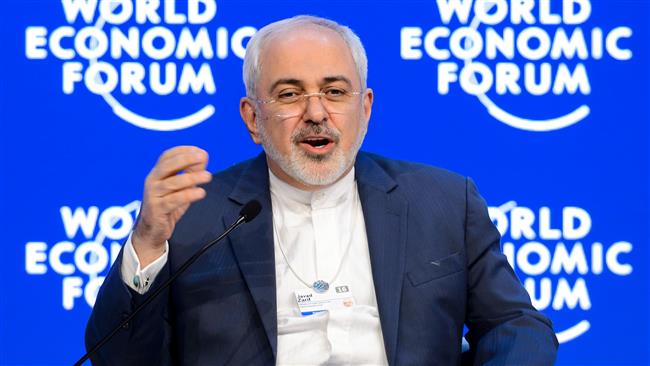“Regionally I think it sends a message that if we can resolve that something everybody thought was impossible to resolve, with countries who were – obviously at least Iran and the United States – were hostile for at least 37 years, then there’s no impediment in resolving regional issues,” Zarif said while addressing the World Economic Forum (WEF) in the Swiss city of Davos on Wednesday.
Zarif said that regional nations, “who’re bound by a common region, common faith, common history, common culture, common values,” can “work together to address a very serious challenge in our region, and that is the challenge of extremism.”
The top Iranian diplomat said that through the nuclear agreement, the Iranian nation’s right to peaceful nuclear technology has been restored “because our nuclear program was always for peaceful purposes.”
“I think the deal is not a perfect deal. No deal is ever perfect. But it deals with our requirement, that is removal of sanctions and at the same time respecting our right to have our nuclear program for peaceful purposes, because our nuclear program was always for peaceful purposes,” he said.
On January 16, Iran and the five permanent members of the UN Security Council – the United States, Britain, France, Russia and China – plus Germany started to implement the nuclear agreement, dubbed the Joint Comprehensive Plan of Action (JCPOA), they had reached in the Austrian capital, Vienna, on July 14, 2015.
After the JCPOA went into effect, all nuclear-related sanctions imposed on Iran by the European Union, the United Nations Security Council and the United States were lifted. Iran in return has put some limitations on its nuclear activities.
Zarif further expressed Iran’s preparedness “to show even greater transparency in order for the International Community to know what we already know, that our program is nothing but peaceful.”
Saudi Arabia concerned about Iran deal
Pointing to Saudi Arabia’s expression of concerns about Iran’s nuclear deal, Zarif said, “Since the agreement in Geneva in 2013, our Saudi neighbors have been panicking. There is no need to panic, our friends. Iran is there to work with you. Iran does not want to exclude anybody from this region. There is no need to engage in a confrontation.”
Saudi Foreign Minister Adel al-Jubeir told Reuters on Tuesday that the removal of sanctions on Iran as a result of its nuclear deal with world powers will be a harmful development if it uses the extra money to fund “nefarious activities.”
Saudi Arabia has been calling for tough inspections of Iran’s nuclear program and the possibility for resuming sanctions against the country.
Syria has no military solution
The Iranian foreign minister further dismissed any military solution to the devastating crisis in Syria, saying the conflict must be settled through diplomatic means.
“There is no military solution to the (Syrian) crisis. We need a political solution,” he said.
He said that a ceasefire in Syria was needed before a national unity government could be formed and elections based on a new constitution held.
“We are determined to provide every contribution and encouragement that we can in order to bring people to the negotiating table. I think what is necessary to make sure [is] that those who believe that there is a military solution are also brought to their senses and brought to the negotiating table,” he said.
Over 260,000 people have reportedly been killed in Syria since foreign-backed militancy erupted in the country in March 2011.
